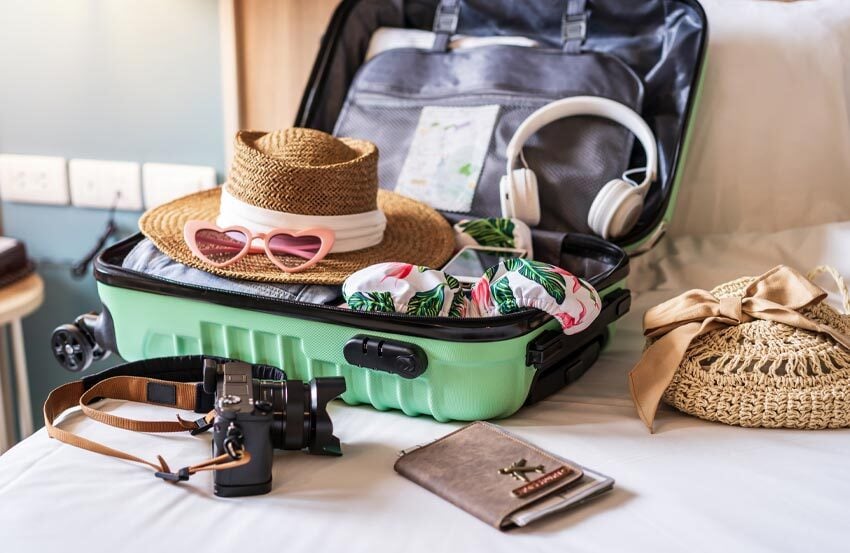Unfortunately, tourists are often a target for thieves, pickpockets and scammers while on holiday. For this reason, it's a good idea to keep your wits about you and take steps to safeguard your belongings.
You can also get added protection with a peace-of-mind travel insurance policy. Here we'll look at how to keep your possessions as safe as possible.

Keeping your valuables safe and secure on holiday
According to government figures, roughly 400,000 passports are reported lost or stolen each year. And that's just passports. Each year, holidaymakers take valuables such as jewellery, smartphones and gadgets away with them - not to mention credit cards and travel money. All of which bring potential risk.
Whether you’re on a weekend city break or backpacking for a year, thieves can take advantage of a momentary lapse of concentration and steal your belongings.
To avoid inconvenience at best and heartache at worst, here are some handy tips and pointers for protecting your personal items on holiday.
Looking for inspiration for what to pack for your trip? Check out our holiday checklist.
1. Better safe than sorry
Hotels frequently have a safe in the room, and it's a good idea to use it. This is certainly preferable to taking your passport and valuables out and about, potentially leaving them exposed. Hostels and private accommodation are increasingly offering safes too.
If you’re in a hostel or hotel with no safe, ask the front desk if they have safe storage anywhere that you can use. For example, lockers or storage behind reception.
Traveller's tip: With some accommodation websites, you can filter for rooms with safes. For example, on Booking.com, you can filter for 'safety deposit box' in the room facilities.
2. At the beach
Your best bet is to avoid taking valuables to the beach in the first place. If your hotel is nearby, just leave everything there.
If this isn't practical and you need to take them with you, see if there are lockers at the beach. Otherwise, if you're in a group have one person guard all your items while the rest of you are in the sea. If you have to leave your towels and clothes, at least keep them in view.
Traveller's tip: It might also be worth Googling 'storage lockers near me'. Sometimes storage companies use local shops to offer lockers, charging a small fee. This could be handy if you're not close to your hotel, but also don't want to take certain belongings to the beach.
3. Be aware of scams
Before you go, research common scams that have occurred where you're travelling. There may be forums and posts on sites about scams people have fallen foul of.
You should also check out the UK Foreign, Commonwealth & Development Office (FCDO) foreign travel advice for the country you're visiting. This is full of useful information for helping keep visitors safe and secure. It can also tell you which areas to avoid.
Some general tips: Stay alert when someone approaches you trying to sell something or asking for help. Only buy tickets for trips and tours from reputable companies through your hotel, or online ahead of time. You can also ask your hotel to book you taxis, as they should use trusted firms. Otherwise, use recognised ranks or well-known companies if available.
4. Consider the bags you use
Bad news for backpackers - these are a prime target for opportunist thieves. Not least because they're worn behind you! If you have a backpack, stay alert in crowds or queues. And consider padlocking your zips.
Some thieves use knives to cut open backpacks, and could cut open a section and rob you before you've even noticed. For this reason, it's a good idea to invest in an anti-theft 'slash-proof' backpack.
Traveller's tip: When carrying just what you need for the day, a smaller bum-bag style packs are likely to be safer. These can remain comparatively hidden under some clothes, and stay within view when you wear them on your front.
5. Back up your devices
If you're taking your smartphone, tablet or laptop with you, it's well worth backing up your files and folders first. You can do this onto a hard drive or cloud storage. It's truly heartbreaking to lose files such as your photos forever.
You should also be wary of having personal information, passwords, bank and credit card details stored on your device. At very least, make sure your device has a strong password, or is protected with a biometric lock.
It's also worth considering travel insurance with gadget cover, which gives you more tailored protection than a regular travel insurance policy.
Traveller's tip: If you're travelling as a couple or family, have an emergency procedure in place in case someone's device is lost or stolen.
6. Make copies of your documents
It's a good idea to have copies of useful and important travel documents, in case your bag containing these is lost or stolen. Take pictures or screenshots of tickets, confirmation of accommodation and activities, your GHIC or EHIC, itineraries and so on. Keep these all in one place. You could email it to yourself, keep it in a folder on cloud storage, or send them to a trusted friend or family member. Or all three.
This could be especially useful if you need QR codes for entry or confirmation. It gives you easy access via your phone - or someone you're travelling with.
It should go without saying, but if you're keeping lots of important files and docs in the same place, make sure it's secure!
Traveller's tip: It's also smart to keep a digital copy of your passport handy. It can make it easier to get emergency travel documents if you lose it, as you'll have details such as your passport number and expiry date available to you. This can help the embassy if you need temporary measures to get home.
Read out guide on what to do if you lose your passport.
7. Spread your belongings out
To reduce the risk of everything being taken at once, divide cash in different bags or pockets. Do the same thing with phones and electrical devices.
Also, when you fly, put your most important items in your hand luggage. Don't put things like vital medication or your main travel money in your check-in baggage, in case they get lost in transit.
Traveller's tip: If you're travelling by yourself, it's not a bad idea to put some spare money or backup credit card in your check-in luggage. This is useful in case your hand luggage goes missing.
8. Consider taking your own locks
Small padlocks can be cheap and easy to take with you. Small cable locks could be useful too. These can be especially handy if you’re on a long train or bus journey and you’re away from your luggage. For example, if you’re interrailing around Europe.
Taking your own locks can also give you peace of mind when you leave your hotel room for a while - especially if there's no safe. You may be able to lock drawers or cupboards, for instance.
Traveller's tip: Taking combination padlocks means you won't need to look after a key or keys.
9. Check the terms of your travel insurance policy
While not a legal requirement, we think travel and holiday insurance is essential. It can’t stop you from being a victim of crime or loss, but it can protect you financially. If you need to replace lost or stolen items, being out of pocket just adds insult to injury.
Each insurer is likely to have different limits depending on what you claim for - for example stolen items, or medical expenses. Familiarise yourself with the policy both before you buy and before you go. And make sure you can afford any excess - in other words, the amount you need to pay before your insurer starts paying out.
Familiarise yourself with the exclusions too. For instance, you won't usually be covered if items are lost or stolen while you're under the influence of drugs or alcohol. And you won't often be covered for the loss of items left unattended.
If you are the victim of theft while abroad, try to report the crime to the local authorities as soon as you can. You’ll need a crime number or report from local police if it was a theft or robbery. You should also claim on your travel insurance as soon as possible.
Traveller's tip: Did you know that you can buy travel insurance with no excess? Well now you do!
Compare travel insurance

